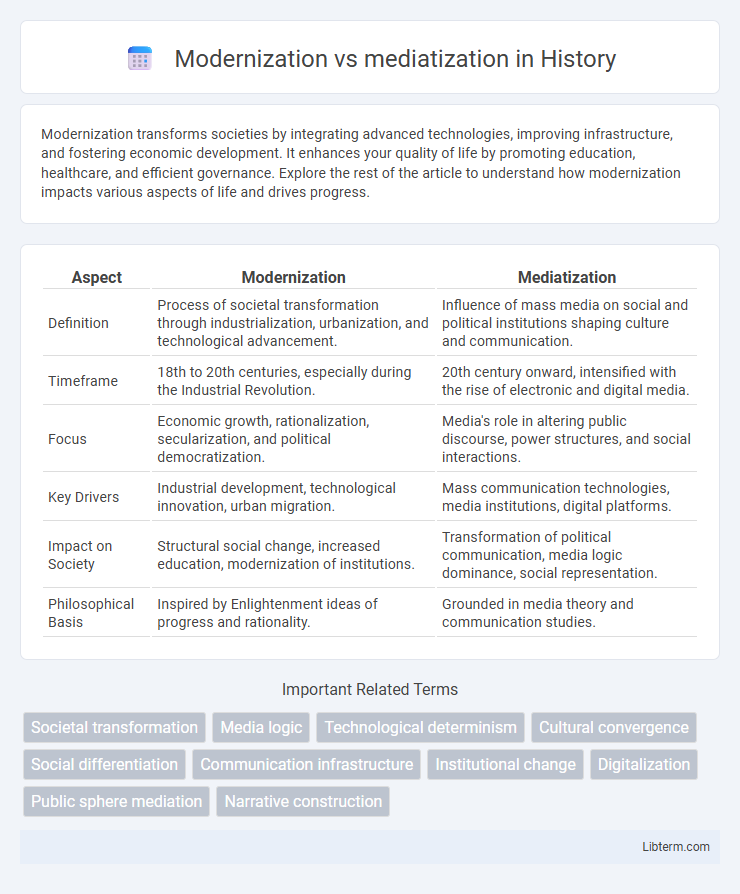Modernization transforms societies by integrating advanced technologies, improving infrastructure, and fostering economic development. It enhances your quality of life by promoting education, healthcare, and efficient governance. Explore the rest of the article to understand how modernization impacts various aspects of life and drives progress.
Table of Comparison
| Aspect | Modernization | Mediatization |
|---|---|---|
| Definition | Process of societal transformation through industrialization, urbanization, and technological advancement. | Influence of mass media on social and political institutions shaping culture and communication. |
| Timeframe | 18th to 20th centuries, especially during the Industrial Revolution. | 20th century onward, intensified with the rise of electronic and digital media. |
| Focus | Economic growth, rationalization, secularization, and political democratization. | Media's role in altering public discourse, power structures, and social interactions. |
| Key Drivers | Industrial development, technological innovation, urban migration. | Mass communication technologies, media institutions, digital platforms. |
| Impact on Society | Structural social change, increased education, modernization of institutions. | Transformation of political communication, media logic dominance, social representation. |
| Philosophical Basis | Inspired by Enlightenment ideas of progress and rationality. | Grounded in media theory and communication studies. |
Understanding Modernization and Mediatization
Modernization refers to the process of societal transformation driven by technological advancements, economic development, and institutional reforms, leading to increased complexity and differentiation in social structures. Mediatization involves the growing influence of media and communication technologies in shaping social norms, behaviors, and cultural practices, altering how individuals and institutions interact. Understanding modernization requires analyzing globalization and industrialization dynamics, while mediatization emphasizes the pervasive role of digital media in redefining public and private life.
Historical Evolution of Modern Societies
The historical evolution of modern societies illustrates the increasing significance of mediatization alongside traditional modernization processes, where social structures and institutions transform through technological advancements and communication media. Modernization emphasizes industrialization, urbanization, and rationalization, while mediatization highlights how media shape cultural norms, political power, and social interactions. Understanding these intertwined dynamics reveals how media technologies have become integral drivers in the continuous reshaping of modern societies.
The Rise of Media in Social Transformation
The rise of media has fundamentally reshaped social transformation by accelerating the mediatization process, where media logic increasingly influences societal institutions and cultural practices. Modernization traditionally emphasizes technological and economic development, but mediatization highlights how media technologies and communication practices reconstruct social interactions and power dynamics. As media permeates everyday life, it alters political participation, cultural norms, and identity formation, making the study of media's role essential in understanding contemporary social change.
Key Differences Between Modernization and Mediatization
Modernization refers to the process of social, economic, and technological transformation leading to industrialization, urbanization, and rationalization of society, characterized by shifts in economic structures and political institutions. Mediatization focuses specifically on the influence of media and communication technologies in shaping cultural norms, social interactions, and political processes, emphasizing the growing dominance of media logic in various societal domains. Key differences include modernization's broad focus on systemic societal change versus mediatization's narrower analysis of media's role as an autonomous force driving cultural and institutional dynamics.
Impact on Culture and Identity
Modernization transforms culture and identity by promoting technological advancement, urbanization, and shifts toward individualism, leading to changes in social norms and lifestyles. Mediatization intensifies this effect by embedding media logic into everyday life, reshaping public discourse and cultural consumption through constant connectivity and representation. Together, these processes influence cultural identity by blending traditional values with globalized media narratives, resulting in dynamic, hybridized cultural expressions.
Influence on Political Systems
Modernization transforms political systems by introducing democratic institutions, bureaucratic governance, and rule of law, fostering political stability and economic development. Mediatization reshapes political communication, increasing the role of mass media in shaping political agendas, public opinion, and electoral outcomes. The interplay between modernization and mediatization leads to evolving political dynamics where media often drives political participation and accountability.
Economic Shifts in a Mediated World
Economic shifts in a mediated world reveal how mediatization drives the transformation of industries by embedding media logic into economic practices, intensifying digital marketing, e-commerce, and data-driven decision-making. Modernization focuses on structural changes like industrialization and technological advancement, while mediatization emphasizes the pervasive influence of media technologies shaping consumer behavior and market strategies. The interplay between modernization and mediatization highlights how economic systems adapt by integrating media platforms, fostering new revenue streams and altering labor markets globally.
The Role of Technology in Shaping Narratives
Technology plays a crucial role in shaping narratives by enabling instantaneous information dissemination and fostering interactive communication. Modernization emphasizes technological advancement as a driver of societal progress, while mediatization focuses on how media technologies transform social and cultural processes. These dynamics illustrate how digital platforms and algorithms increasingly influence public discourse and collective memory.
Challenges and Criticisms of Each Paradigm
Modernization faces criticism for its linear assumption that societies progress through fixed stages, often overlooking cultural diversity and local contexts. Mediatization challenges include its broad definition, which can overstate the media's influence by attributing all social changes to media logic. Both paradigms struggle to account for complex, multidirectional interactions between media, society, and technology, leading to debates on their explanatory power.
Future Prospects: Convergence or Divergence?
Future prospects of modernization and mediatization indicate potential convergence as technological advancements integrate media deeply into social and political systems, enhancing communication and governance structures. However, divergence may persist due to cultural, economic, and institutional variations affecting how societies adopt media technologies within modernization frameworks. The dynamic between digital innovation, media influence, and societal transformation shapes the evolving relationship between modernization and mediatization.
Modernization Infographic

 libterm.com
libterm.com